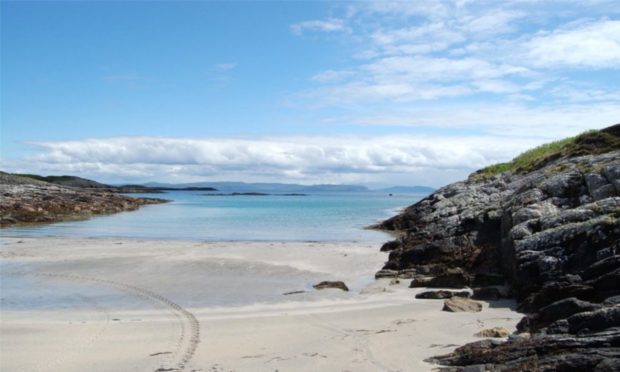Residents on an Inner Hebridean island are having to travel up to six miles just to access safe drinking water.
Coll, situated west of Mull in the Argyll and Bute Council area has 102 properties on mains water with 126 on private supplies.
Due to the land having a lot of rock with lead in it, many of the private water supplies do not meet health regulations.
It means many islanders have to drive six miles to access the public tap in the main village of Arinagour.
Lockdown has exacerbated the problem, with people who are shielding running the risk of coming into contact with others.
Things have become so unbearable that Coll Community Council raised the issue with the council’s Oban Lorn and the Isles Area Committee.
Councillor Mary Jean Devon, based on Mull, told the committee: “A lot of people have to go to a standing pump at the public toilets. That is where they get their drinking water supply from.
“It is awful. It was dreadful during lockdown when people who were shielding had to go out at five in the morning so they didn’t see anyone.
“A lot of the water wouldn’t pass muster because there is lead in the ground. It is a huge concern.
“This has gone on for 10 years. I just found out about it a fortnight ago.”
Resident and former rugby international Rob Wainwright added: “It’s not great. On other islands the cattle in the fields get mains water but our houses don’t get it on Coll.”
Councillor Jim Lynch added: “This is unacceptable. It should not be happening in the 21st century. There is a economic development problem here. Who will build houses in places with no water supply?
“This is a huge issue. Is this acceptable in the 21st century? It is not.”
Chairwoman Elaine Robertson agreed. She said: “We will write to the Scottish Government about this.”
A Scottish Water spokeswoman said: “Across Scotland there are around 20,000 properties which have private water supplies. These types of supplies fall under the remit of the local authority environmental health department and then to the Drinking Water Quality Regulator.
“For private water supplies, local authority environmental health departments are the primary contacts if assistance is required, although we do have emergency procedures in place with all the local authorities across Scotland in the event they need to contact us for assistance.
“Scottish Water’s investment is set as part of a comprehensive process which involves the Scottish Government, our economic, environmental and drinking water quality regulators as well as key stakeholders and customers.
“Currently, customers wishing to connect to the public network should carry out and fund any necessary work themselves, similar to how a developer connects new houses to the public network.
“In some cases, depending on specific circumstances, if appropriate standards are met, we can then adopt the network and make a reasonable cost contribution toward the work. We’re still in the process of confirming investment priorities beyond 2021, however it is likely that a similar arrangement will continue.”
Covid exacerbates long-running drinking water problem
Islanders have been putting up with the drinking water situation on Coll for years, but the circumstances surrounding Covid-19 have exacerbated it.
Julian Senior, Coll Community Council, said: “Of the properties on the island, 55% are out with the village of Arinagour.
“There is no mains water to any other properties out with the curtilage of the village.
“Quite a lot of the supplies don’t allow people to draw drinking water. They have been happy to use it to bathe and do washing but as far as drinking water is concerned they can’t rely on their water supply.
“We have got a lot of rock in our land with lead in it. That is never easy.
“It was very challenging for people during lockdown. They had to drive five or six miles for drinking water and then five or six miles home.
“The lockdown has exacerbated the situation, particularly for people who are vulnerable. It made things rather worse and pin pointed the problem again which has been going on for years.
“I am on mains water but there aren’t many houses available in the village. Some people have to live outwith the village because that’s where a lot of the houses are.”
Councillor Roddy McCuish said: “We are holding up development on a fragile island.”
A spokesman for the Scottish Government said: “While we have not yet received this correspondence, we will engage promptly with Scottish Water and the Drinking Water Quality Regulator to fully understand this important issue and reply in due course.”
